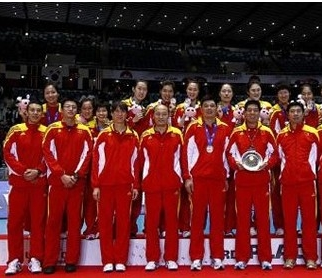
Clad in red and gold, China's Olympic athletes may still intimidate the competition in London. Many were selected as young as 6 years old to become Olympians and have spent most of their lives in government-subsidized schools and gyms training to win a medal for their country.
身著紅金兩色運(yùn)動(dòng)服的中國(guó)奧運(yùn)會(huì)運(yùn)動(dòng)員在倫敦仍將給同場(chǎng)競(jìng)技的對(duì)手造成壓力。很多中國(guó)運(yùn)動(dòng)員6歲就被選出來(lái)培養(yǎng)成為奧運(yùn)選手,他們的大部分青春都是在政府出資建設(shè)的體校和體育館里度過(guò)的。漫長(zhǎng)的訓(xùn)練就是為了能給國(guó)家贏得一塊奧運(yùn)獎(jiǎng)牌。
Yet this year, China looks to suffer declines in several sports where long-term domination appeared inevitable, including gymnastics, shooting and judo. It also doesn't figure to improve much in the medal-rich sports where it has been weak, such as swimming and track and field.
但是今年,中國(guó)可能會(huì)在多個(gè)常年保持優(yōu)勢(shì)的項(xiàng)目上出現(xiàn)較大滑坡,包括體操、射擊和柔道。在游泳和田徑等獎(jiǎng)牌大戶但中國(guó)實(shí)力薄弱的項(xiàng)目上,中國(guó)也沒(méi)有找出太多改進(jìn)的方法。
Top Chinese sports officials aren't boasting about their medal chances in London, declining interviews with The Wall Street Journal and playing down expectations in the state-controlled domestic media.
中國(guó)最好級(jí)別的體育官員并沒(méi)有吹噓中國(guó)代表團(tuán)在此次倫敦奧運(yùn)會(huì)上爭(zhēng)取獎(jiǎng)牌的機(jī)會(huì)有多大,同時(shí)拒絕接受《華爾街日?qǐng)?bào)》的采訪,還通過(guò)本國(guó)官方媒體降低外界對(duì)中國(guó)代表團(tuán)表現(xiàn)的預(yù)期。
'In the past four years, other countries and regions have prioritized Olympic preparations,' Liu Peng, head of the Chinese General Administration for Sport, told state-run China Daily earlier this month. 'We have to be fully prepared for all the difficulties and challenges.'
中國(guó)國(guó)家體育總局局長(zhǎng)劉鵬本月早些時(shí)候接受《中國(guó)日?qǐng)?bào)》(China Daily)采訪時(shí)說(shuō),過(guò)去四年中,其他國(guó)家和地區(qū)都將備戰(zhàn)奧運(yùn)會(huì)當(dāng)作重中之重,我們必須為所有困難和挑戰(zhàn)做足準(zhǔn)備。
Wall Street Journal projections show China winning 38 gold medals and 92 overall, down from 51 and 100 in 2008.
《華爾街日?qǐng)?bào)》的預(yù)測(cè)表明,中國(guó)在此次倫敦奧運(yùn)會(huì)上將贏得38枚金牌,獎(jiǎng)牌總數(shù)為92枚。而2008年中國(guó)摘得的金牌數(shù)為51枚,獎(jiǎng)牌總數(shù)為100枚。
The Big Letdown
巨大落差
It's common for Olympic hosts to show a slump in the medal tallies four years after their own Games. Like most former hosts, China seems to have slowed its investments in facilities and training, with some exceptions like a $100 million investment in a state-of-the-art pentathlon training facility in Chengdu.
奧運(yùn)會(huì)東道主在承辦完比賽后的下一屆奧運(yùn)會(huì)上獎(jiǎng)牌總數(shù)出現(xiàn)較大下滑并不罕見(jiàn)。和此前大多數(shù)奧運(yùn)會(huì)承辦國(guó)一樣,中國(guó)似乎放緩了在體育設(shè)施和訓(xùn)練上的投資,不過(guò)也有一些例外,比如在成都投資1億美元興建的先進(jìn)的現(xiàn)代五項(xiàng)運(yùn)動(dòng)訓(xùn)練中心。
Another big factor at work: China's changing population has more economic options these days偉and the state's rigorous Olympic training doesn't look as appealing as it used to.
導(dǎo)致這一現(xiàn)象的另一大因素是:人口結(jié)構(gòu)的變化使得如今的中國(guó)人在經(jīng)濟(jì)上有更多選擇。在中國(guó)人看來(lái),為備戰(zhàn)奧運(yùn)會(huì)而進(jìn)行的嚴(yán)格訓(xùn)練如今看來(lái)不像過(guò)去那樣有吸引力。
Chinese athletes with Olympic medal potential see little of their families, and many of the most basic aspects of their lives are directed by the state. At the national training center in Beijing, officials stipulate athletes can eat food only from the center's canteen - even on their days off - out of concerns that tainted meat could cause athletes to fail drug tests, according to the state-run China Daily. (Officials didn't respond to questions about athletes' diets.)
有希望在奧運(yùn)會(huì)上摘金奪銀的中國(guó)運(yùn)動(dòng)員很少同家人見(jiàn)面,其生活中很多最基本的方面都要聽(tīng)從國(guó)家指示。據(jù)《中國(guó)日?qǐng)?bào)》報(bào)道,在北京的國(guó)家訓(xùn)練中心,有關(guān)負(fù)責(zé)人規(guī)定運(yùn)動(dòng)員只能在訓(xùn)練中心食堂用餐,哪怕不在訓(xùn)練期間也是如此。這是因?yàn)橛嘘P(guān)部門擔(dān)心受污染的肉類可能導(dǎo)致運(yùn)動(dòng)員無(wú)法通過(guò)藥檢(相關(guān)負(fù)責(zé)人沒(méi)有回應(yīng)記者提出的有關(guān)運(yùn)動(dòng)員飲食方面的問(wèn)題)。
Indeed, some Chinese Olympians paint a painful picture of life inside the sports system. 'We all lacked freedom as athletes,' says Guo Jingjing, who retired in 2011 after winning four gold medals in diving at the Beijing Games. 'You begin so young that you know little else.'
事實(shí)上,按照一些中國(guó)奧運(yùn)選手的描述,在體育系統(tǒng)內(nèi)部的訓(xùn)練生活非常痛苦。2011年退役的郭晶晶說(shuō),作為運(yùn)動(dòng)員,我們?nèi)既狈ψ杂桑瑥暮苄【烷_(kāi)始訓(xùn)練,對(duì)其它事情了解很少。郭晶晶在北京奧運(yùn)會(huì)上贏得了兩枚跳水金牌。
The pressure is intense, Guo says, but it helped the Chinese win so many gold medals in 2008. 'Americans get so nervous at competitions,' she says.
郭晶晶說(shuō),壓力非常大,但靠壓力中國(guó)人在2008年贏得了那么多的金牌。她說(shuō),美國(guó)人在比賽時(shí)非常緊張。
A Rounded Approach
全能選手
But pressurized training may not be enough this time around. China won the gymnastics team gold in 2008, for instance, but will fight to even win bronze in London. Why? Because China isn't cultivating the same kind of young, all-around athletic talent as the favored U.S., where sports are the main extracurricular activity for millions of children.
但現(xiàn)在僅高強(qiáng)度訓(xùn)練是不夠的。例如,中國(guó)在2008年贏得了體操團(tuán)體項(xiàng)目金牌,但在倫敦拿銅牌都比較困難,為什么呢?因?yàn)橹袊?guó)沒(méi)有像奪冠希望較大的美國(guó)那樣培養(yǎng)出年輕的全能型體育人才。在美國(guó),體育運(yùn)動(dòng)是數(shù)百萬(wàn)兒童的主要課外活動(dòng)。
U.S. gymnasts, like so many members of the U.S. Olympic team, benefit from a sports culture that encourages children to play multiple sports from an early age. A quarter of China's medals in 2008 came from shooting, table tennis and badminton, sports that aren't known for attracting the world's greatest all-around athletes.
美國(guó)體操運(yùn)動(dòng)員和美國(guó)奧運(yùn)代表團(tuán)中的許多其他成員一樣,都受益于一種鼓勵(lì)兒童從小從事多種體育運(yùn)動(dòng)的文化。2008年中國(guó)獲得獎(jiǎng)牌四分之一都來(lái)自射擊、乒乓球和羽毛球,這些項(xiàng)目對(duì)于世界上最優(yōu)秀的全面發(fā)展的運(yùn)動(dòng)員來(lái)說(shuō),吸引力不是很大。
Lu Shanzhen, chief coach of the Chinese women's gymnastics team, says China doesn't 'do very well in training all-around athletes' compared with the U.S.
中國(guó)女子體操隊(duì)總教練陸善真說(shuō),和美國(guó)比起來(lái),中國(guó)對(duì)全能型運(yùn)動(dòng)員的培養(yǎng)做得不是很好。
'Their competition system and training system requires all young athletes to participate in all-around competitions,' he says.
他說(shuō),他們的比賽制度和訓(xùn)練制度要求所有年輕運(yùn)動(dòng)員都參加全能項(xiàng)目。
At China's sports schools, only recently has the emphasis shifted to graduating all-around athletes. 'There has been a big debate in China for years about the overemphasis on the pursuit of gold medals,' says Susan Brownell, a professor of anthropology at the University of Missouri, St. Louis, who has written extensively about Chinese sports. 'The whole debate has become more about expanding opportunities for the general populace.'
中國(guó)的體育運(yùn)動(dòng)學(xué)校直到最近才把重心轉(zhuǎn)移到全能型運(yùn)動(dòng)員的培養(yǎng)上面。密蘇里大學(xué)圣路易斯分校(University of Missouri, St. Louis)人類學(xué)教授布勞內(nèi)爾(Susan Brownell)曾大量撰文討論中國(guó)體育。她說(shuō),幾年以來(lái),中國(guó)國(guó)內(nèi)一直在討論過(guò)分注重金牌的問(wèn)題;整個(gè)討論的重點(diǎn),已經(jīng)是如何為大眾拓展機(jī)會(huì)。
Better than Big
文武雙全
In fact, China's top leadership has set a goal to transform China from a 'large athletic country' to a 'strong athletic country.' Since 2010, schools like Beijing Shichahai Sports School, which has produced 33 world champions, have been required to spend more time on academics and less on hard training. The goal is to better prepare the students岸many of whom won't make it in into China's national team or into professional sports岸for a mainstream life and job, and to make sports schools more attractive to new talent as the schools face declining interest.
事實(shí)上中國(guó)高層領(lǐng)導(dǎo)人已經(jīng)設(shè)定了一個(gè)將中國(guó)從“體育大國(guó)”轉(zhuǎn)變?yōu)椤绑w育強(qiáng)國(guó)”的目標(biāo)。從2010以來(lái),像培養(yǎng)了33位世界冠軍的北京什剎海體育運(yùn)動(dòng)學(xué)校等,已被要求增加文化課程學(xué)習(xí)時(shí)間,減少用于艱苦訓(xùn)練的時(shí)間,目的是讓學(xué)生更有條件融入主流社會(huì)的生活與工作,因?yàn)楹芏嗳耸沁M(jìn)不了國(guó)家隊(duì),也進(jìn)不了職業(yè)體育運(yùn)動(dòng)隊(duì)的。另外的一個(gè)目的是在人們對(duì)體校興趣下降之際,增強(qiáng)這些學(xué)校對(duì)于新人才的吸引力。
Tian Junlin, a badminton coach at Shichahai, says the new focus on academics has also had noticeable impact on athletes on the court that could pay off down the road. 'It helps them develop critical thinking and strategy,' Tian says. 'This is really good, especially for ball-related sports.'
什剎海體校羽毛球教練田俊林(音)說(shuō),對(duì)文化課的重視也對(duì)訓(xùn)練場(chǎng)上的運(yùn)動(dòng)員產(chǎn)生了明顯的影響,將來(lái)可能會(huì)有好處。田俊林說(shuō),文化課有助于學(xué)生培養(yǎng)批判性思維,形成自己的戰(zhàn)略,這是非常好的,特別是對(duì)球類運(yùn)動(dòng)來(lái)說(shuō)。












